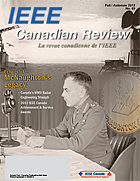|

|
|
IEEE Canadian Review On-line
La revue canadienne de l'IEEE
|
|

|
|
Fall / Automne 2012, No. 69
|
|

|
In English
-
-
-
-
-
-
-
-
-
- |
Editorial
President's report
Canadian newslog
Regional Coverage: A View from the West
Book Review: Tubes -- A Journey to the Center of the Internet
Industry Relations: Exploring Channels to Marketplace Success
Experiential Learning: The Quarter-inch Drill-- The True Meaning of Experience
Engineering Management: "Best Of" from the Literature
Conferences 2013/2014
CCECE 2013 |
COMMUNITY NEWS
|
En français
(en développement)
|
|
 |
|
Feature article
|
|
Article de fonds
|
|
|
 |
|
|
|
Title/Titre:
Last One Standing
|
|
Author/Auteur: Brian Mendes
|
|
Abstract:
Ahead of British and American counterparts, Canadian engineers and scientists developed the first centimetric wavelength gunlaying ( anti-aircraft-guiding) radar to be mass produced, deployed in July 1942. The period between approval to proceed and demonstration of a working prototype was a mere 18 months. This extraordinarily rapid development was achieved through the cooperation of scientists at the Radio Branch of the National Research Council and engineers at a crown corporation facility in Toronto known as Research Enterprises Limited. The project was initiated following the disclosure to American and Canadian scientists by Britain in August 1940 of the Cavity Magnetron, the first practical compact to produce high powered pulses of radio energy in the centimetric waveband. Canada’s preparedness to undertake the necessary massive expansion of personnel was in large part due to the foresight of General Andrew McNaughton, who had been appointed president of the National Research Council in 1935, staying in that position until the start of WWII. A largely intact cabin containing the equipment for producing/transmitting/receiving the centimetric radio waves -- the only one of its kind -- is on display at the Royal Canadian Artillery Museum at Canadian Forces Base Shilo, Manitoba.
|
Sommaire:
(en développement)
|
|
 |
Please consider advertising with the
Review.
Click here for details.
Considérez devenir un commanditaire de la
revue. Cliquez ici pour les détails.
|
Last update / 2013-01-15
/ Dernière mise à jour
|



